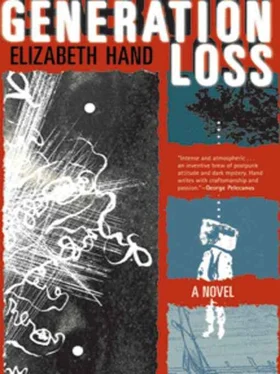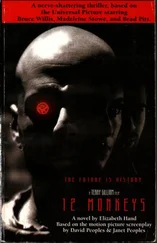“It’s too raw,” Linda told me when, after six years, I had finally put together another portfolio, enough pictures for another book. “It’s too much like being right inside someone’s head.”
I stared at her, the late afternoon sun in her uptown office, her gold jewelry and Armani jacket. “It is inside someone’s head, Linda. It’s the inside of my head.”
She pushed the portfolio across her desk back toward me. “I know,” she said. “Maybe you should show them to someone else, Cass.”
I left. No one else wanted me.
* * *
Twenty years passed. I participated in a few group shows at hole-in-the-wall galleries. Now and then someone would buy one of my photos, and there was the occasional mention of Dead Girls , usually as a footnote to work by Cindy Sherman. When the time came, I didn’t switch to digital. It wouldn’t have been hard. Light is light, you just have to know how to find it, where to look for that slant of shadow, that moment when someone’s eyes first open and you can’t be certain if they’re dead or asleep. I could have ditched my old Konica, just like I could have gotten another job or bought better clothes or gotten involved with someone.
This is what you have to understand about me: I could have changed. I didn’t want to. I fucked people I’d meet at clubs: men, women. Nothing ever lasted long. Ravaged as I was, I was still good-looking enough. But I was a bad drunk. Eventually I could walk into most cafes in the East Village and watch every person hide behind a newspaper or laptop.
Despite that, in 1998 I got involved with a married woman named Christine Conti, a professor who specialized in the French Nouvelle Vague. She was thin, dark, chic, emotionally intense, a recovering alcoholic with issues. We were a good match sexually, but we argued a lot. After a while we argued constantly. I drank too much. Eventually Christine left her husband and got her own place, down near Battery Park, but it still didn’t work out between us, not really. She said I wasn’t a fully integrated person. I refused to quit drinking. I refused to go to an AA meeting. She refused to leave me.
Then I hit her. She called the police but then said she wouldn’t press charges if I promised to get help. I suggested maybe she was the one who needed help, for staying with me, but I went. We saw a counselor. I sat there while Christine threw out words like predatory, detached, obsessive . The counselor came back with dissociative amnesia, depersonalization, affective disorder . The counselor recommended a psychiatrist, who put me on a regimen of lithium and antidepressants.
I took the medications for a week. They made me feel as though my brain had been shot full of strychnine. I refused to ever take them again. The doctor suggested other drugs, but I never went back to her.
“This is as integrated as my personality gets,” I told Christine. “So get used to it or get out of here.”
Christine, for whatever reason, continued to see me.
We didn’t fight as much, but I still drank. My few other friends lived lives less marginal than my own. I think they kept me around as an eidolon of the sort of bleak bohemianism they’d lost—still listening to the same old music, still going to work with a hangover, still sleeping in my ratty rent-controlled apartment on a piece of plywood with a foam mattress on top.
Finally even Christine had enough. Gradually, I stopped seeing even my few remaining friends. I stopped going to clubs to hear live music. I shot fewer and fewer rolls of film and lost the few contacts I’d kept in the dwindling rock press. When I didn’t have enough money to buy the photography books I wanted, I’d steal them.
Then Christine died. She’d called really early that morning and left a message: she was meeting someone for lunch at Windows on the World. Would I meet her for coffee first? We could talk things over. It might be better. It had been a long time. Maybe she was starting to get over some things. Maybe I had changed.
I hadn’t changed. Not enough, anyway. I erased the message and didn’t call her back. A few hours later the sirens started, the smoke. The sky was ice-blue. The phone rang, Phil Cohen screaming into my ear from Hoboken.
“Do you see it, Cass, do you see it?”
I looked out the window.
“Oh fuck ,” I yelled and dropped the phone.
When I stuck my head out, eddies of ash and paper were showering onto Hudson Street, the stink of jet fuel. People stared up with mouths open like they were catching snowflakes on their tongues. Shouting.
It was like being inside a breaking glass. Christine was already dead, though I didn’t know that yet, didn’t know she had gone down there anyway, early, thinking I might show up. Thinking I might have changed. You never know.
I lifted my face to where a single white contrail blurred into the rain of black grit and glass and ember. A charred fragment of paper fell onto the back of my hand and stuck there, damp, warm. I peeled it from my skin and read it.
For when first we
I smoothed the scrap against my palm then placed it upon my tongue. It tasted of petroleum, scorched metal. I swallowed it: a moment later began to vomit uncontrollably.
No one ever contacted me about a memorial service for her. I wouldn’t have gone, anyway.
The wars began. I drank even more. For a while I saw flyers downtown with her face on them—her ex-husband and parents put them up. Every time I saw one I wanted to scream. I wanted to kill someone. Finally I began ripping them down, ignoring the angry looks I got from people on the street. Sometimes, alone in my apartment, I did scream. She was gone, it was all gone, there was nothing I could have done, nothing anyone could ever have done about anything. Why the fuck was I the only one who understood that?
That dead light that comes in late afternoon in winter, that light that makes everything look like it was cut from black ice—I could feel that light on me in the middle of summer; in the middle of the night. For a few months I got headaches, a blinding pain in my right eye, as though a spark had burned my retina. The ophthalmologist found nothing, but I could feel it, the hole left by a molten wire, a bit of ash or ember. I stared at my eye in the mirror, looking for a scar or scratched cornea, but there was nothing. It got so I had to drink three shots of bourbon just to get the nerve to pick up my camera.
I tried to forget I had ever been involved with Christine, or anyone else. Like the song goes, you can’t put your arms around a memory. I was forty-eight, and my life had been over for decades. That was when Phil Cohen called me about Aphrodite Kamestos.
Phil was an old crony from the East Village who now lived in Hoboken, a one-time drug dealer and music promoter who did freelance work for various print magazines and websites, along with writing a blog called Early Death. The rise of hip-hop and crap pop had reduced his job security significantly, but his addiction to speed had left him with admirable work habits, and he still got me meth or black beauties when I needed them. He seldom slept, he wrote compulsively, and he was constantly, obsessively, in touch with anyone who might give him work. If the city were to be flattened by a nuclear bomb, Phil would be scrabbling in the ashes, sending up smoke signals to other survivors in Hoboken. He resembled Don Knotts circa The Incredible Mister Limpet , only not quite as good-looking.
Still, Phil had always looked out for me, with mixed results. I ran into him at a coffee shop one rainy morning in October.
“Hey hey hey. Cassandra Android, how you doing?”
“Phil. It’s fucking great to be alive.”
Читать дальше












